Kako and FC Inanga on the bus to the final game of the Comorian Women’s Football National Championship (Photo: Courtesy of Kako Yamada)
Abruptly evacuated from Comoros, Kako Yamada returns to a very different U.S.
By Kako Yamada, Contributor
“I hope that the next time I answer you, a call or message will mean that I am still alive.” That’s how the message from my friend started.
I laughed and rolled my eyes, thinking, “He’s being so dramatic.” But I now know, he wasn’t.
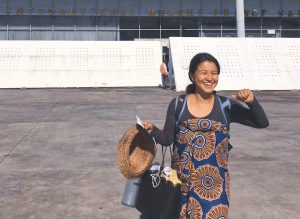
Kako wears a traditional Comorian dress while walking out to the plane leaving Comoros, holding a traditional Comorian hat gifted to her by her local language teacher, along with her flight ticket home. (Photo: Courtesy of Kako Yamada)
As I perused the makeshift gift store at Prince Said Ibrahim International Airport in March to gather Comorian souvenirs to bring home to family in New York, the airport’s single waiting room was bustling with our group of Peace Corps Volunteers in varying levels of disarray and fatigue.
We had gone to sleep a few days earlier under the familiar Comorian stars. But then life completely changed. Soon, we all woke up to a completely different reality: an abrupt evacuation back to the United States due to concerns over COVID-19.
Our plans for the remaining months or years of service vanished as we collected what we could of our belongings — some able to say their good-byes, others not so lucky. I had been allotted one hour to pack and say my farewells to my host family — leaving my friends, students, teammates and co-workers in the dust about my sudden departure.
As a way to break the news as personally and professionally as possible at that point, I squeezed in as many phone calls as I could as the boarding gates closed in on me — a fate that I’m sure was shared among many of the 7,300 Peace Corps volunteers who were evacuated from more than 60 posts worldwide.
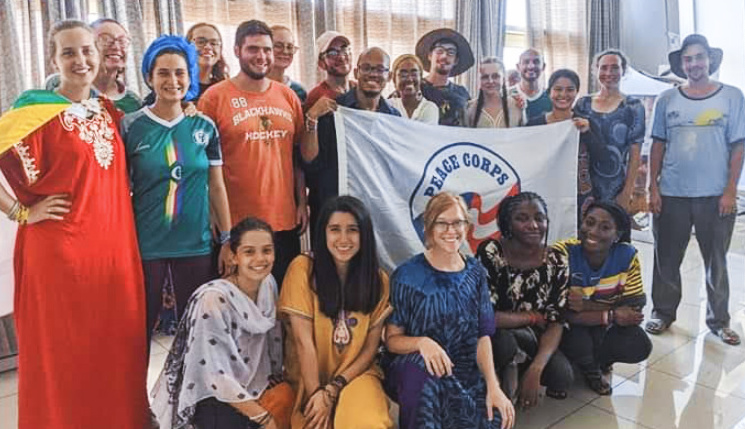
One final group picture at the airport as Peace Corps Comoros Volunteers were evacuated to their homes in the United States. (Photo: Courtesy of Kako Yamada)
Over the duration of my two-day journey back home, the seriousness of my friend’s message crescendoed as the hue of reality got darker in front of my eyes. From an island country in the Indian Ocean untouched by COVID-19, I was headed home to the epicenter of the pandemic: New York City.
The gravity of the situation seeped into my skin with each narrowing mile during that flight to (what was supposed to be) my grand return to the arms of (read: 6 feet distance to) my family members.
On my layover in Addis Ababa, I saw people in full body suits; on the subsequent plane, flight attendants wore gloves and asked passengers not to help one another. Upon arrival at Newark Airport in New Jersey, a hollow silence echoed. Welcome home.
It was not until May 1 that President Azali Assoumani announced the first case of COVID-19 in Comoros. By then, in the month and a half since I had returned to the U.S., there had been 304,372 reported COVID-19 cases in New York, a number that equated to half the population of Comoros.
This, more than anything, perplexed my Comorian friends: Why did you leave the safety of Comoros to a place with COVID-19? We both knew the answer: There are hospitals and greater chances of survival here.
In Comoros, where there is next to no medical care, unreliable electricity rendering stocking up a near impossibility and community-based living styles incompatible with social distancing, the chances of survival appeared slimmer there.
Viruses do not see religion, race or wealth. They do not pick and choose.
— Kako Yamada
It came down to privilege. After months of integrating — through language, food and dances — in the end, I am privileged. In a pandemic, I, as an American citizen and Peace Corps Volunteer, got to fly out to a country with better health care.
No matter how much I had seen and felt that people are not different — that I had made connections not hinging on impressing one another with labels, accomplishments and wealth — I could not escape the fact that I was a volunteer that would disappear if things got bad.

Kako with her fitness coach and teammates after completing the annual International Women’s Day 5K in Moroni. (Photo: Courtesy of Kako Yamada)
Therefore, on top of immediate health concerns and a sense of uselessness to my local New York community, this guilt and escalating fear over what could happen in Comoros when COVID-19 arrived there plagued my conscience.
Contrary to my paranoia, everything in Comoros had proceeded as usual. I would call my friends and family everyday to check on the situation. They’d tell me, “No cases.” But under their breath, they also expressed that there were no tests, no hospitals, no government to be trusted, as well as no reliable news sources.
At the same time, my attempts to share precautionary measures, while being mindful of not coming off as a Western know-it-all, faced pushback.
Many people claimed COVID-19 to be a conspiracy and asserted that Comorians are stronger than COVID-19. I found it frustrating to care for people who did not seem to care to increase chances of survival.
After all, many of my friends shared the belief that the devout Islamic country would be protected by Allah, which brought me back to interactions in January, where neighbors would say, “You know the Chinese are dying of this virus. It is Allah’s divine punishment for how they mistreat their Muslims.”
I remember biting my tongue and restraining myself from calling out the racist assumption that God would punish all people in China for the treatment of Uyghur Muslims.
At the time, as a Peace Corps Volunteer, it seemed important to pick which battles to fight — what opinions to share and not to share, what cultural values to open up about and which to hide. Now, I regret more of what I did not say and did not do.
Perhaps if I had spoken up then, it would be easier to also be openly communicative now. Then, I could see a two-way street of sharing ideas as equals rather than being overly conscious of my positionality and how sharing my ideas may echo ways in which colonialsts forced their beliefs.
In the end, viruses do not see religion, race or wealth. They do not pick and choose.
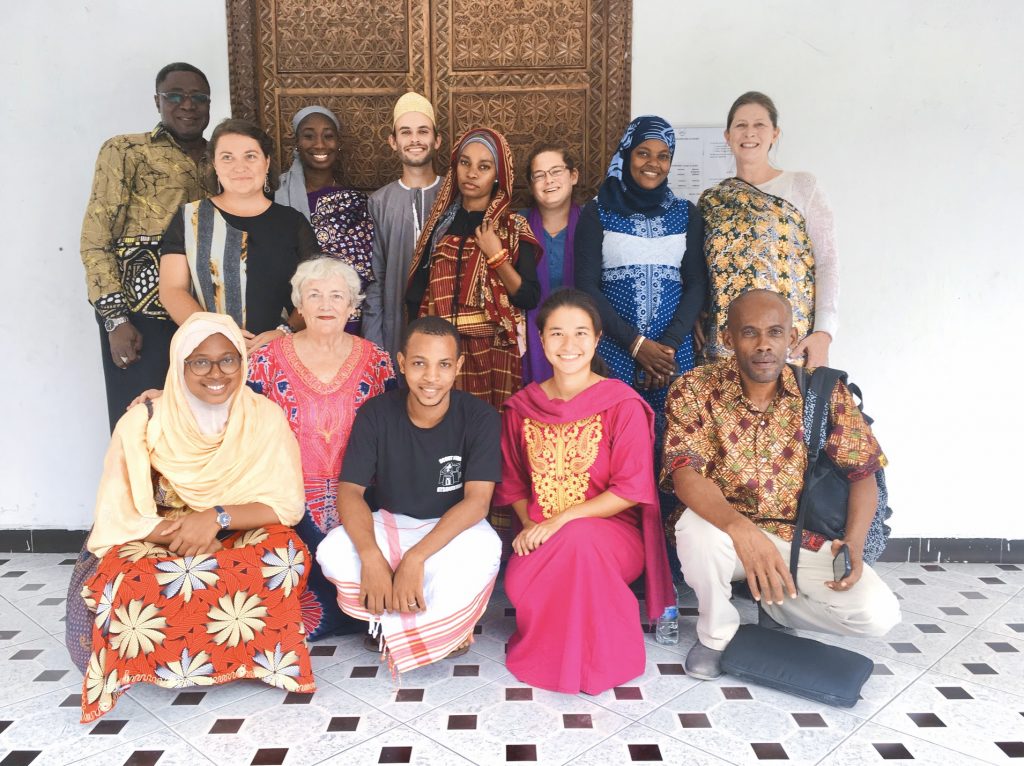
Kako represented Peace Corps with fellow volunteers, staff and host country partners at the international celebration of the “Day of the Mother Tongue,” hosted by the National Museum and the Ministry of Education. (Photo: Courtesy of Kako Yamada)
But, I knew that regardless of how they’d try to convince me that they will be fine, my friends also understood this. The denial was a tactic to deal with fear. And how could I blame them, for wouldn’t hopeful denial be easier to accept than the realities of a pandemic in which your surroundings are nowhere near equipped to save you?
In the midst of all of this, one theme became immensely clear: The situation of a country miles away, often labeled as one of the poorest in the world, is very much mirrored here in the United States.
The characteristics of denial, governmental inadequacies and systematic vulnerabilities of certain social groups over others are paralleled. However, one quality is certainly different: We have the resources, and yet, we dared to fail.
Here, we did not prepare due to racist and exceptionalist sentiments that we are immune to the virus or that “it’s a China problem.” And while we individually may not hold these views, President Trump represents the view of the American people to communities abroad.
Many of my Comorian neighbors’ sentiments around the virus being Chinese was directly quoted from President Trump’s words, and it was assumed that I also supported such views seeing as I am American.
Yet, when I came to America, I had to learn to be Asian again.
I transitioned from warmly greeting every passerby in Comoros to relearning to cast my gaze down out of fear that I would be attacked for being Asian. I cannot see people, and I cannot be seen.
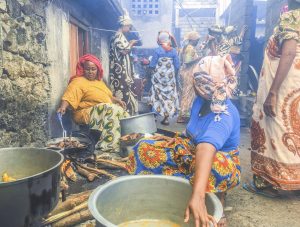
Kako Yamada would go with her host mother to cook in the morning, enjoying a feast of breads, plantains, grilled chicken and fish. (Photo: Courtesy of Kako Yamada)
I am ashamed. I am ashamed when my Comorian friends ask if a vaccine has been found, bright eyes looking up to the United States, the most powerful country in the world, to find a solution.
I am ashamed to tell them, “No,” and see their glimmer of hope flicker as they slowly accept that their country has no chance of survival if a country as strong as the United States has been hit so hard by this virus.
But, this is wrong. The United States is far from the strongest country. Many countries with fewer resources, such as Vietnam, have done much better at preparing and dealing with this pandemic. Which makes me wonder: Are my fears of Comoros being wiped out disrespectful?
While the ways in which the Comorian government decided to hide cases of COVID-19 and suppress anyone who tried to speak about them leave me worried for the worst, are my fears that Comoros may be doomed stemming from a neocolonialist view that poor countries cannot handle this pandemic? In fact, many African countries have tactically minimized the number of cases in these trying times.
On the contrary, our divided country has forgotten that in life, liberty and the pursuit of happiness, life comes before all. We have completely lost reason in a blind pursuit of liberty.
When people protest in front of hospitals or call for their freedom to get haircuts, instead of shaming or writing off people as stupid, we must try to understand, especially because we disagree.
America, please listen. America, I will listen to your opinions and why you decide to protest because I don’t understand why, and I don’t know your situation, but I want to understand.
And we do not need to agree, but I will no longer bite my tongue either. We, America, should be ashamed; we are no longer a country for people to look up to, perhaps we never were. We have failed. We need to admit this. And maybe in doing global volunteerism and helping “developing” countries, it’d be much more effective to redevelop our own country from the base. In looking inward, we must also see the lesson that we can learn from every other country, too.
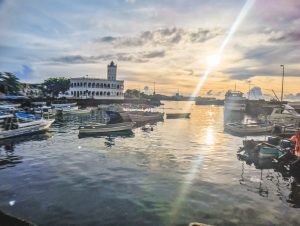
The Old Friday Mosque, one of the oldest and most important buildings in Moroni, is an iconic landmark that Kako Yamada would pass every time she would come to the capital for her monthly bank day. On this calm afternoon, she enjoyed a walk from her bus stop to the other side of the city. (Photo: Courtesy of Kako Yamada)
At first, I wanted to say, “Let’s call this what it is: a war on the poor.” In the United States, the black and brown population are suffering the most deaths. Immigrants and migrants in detention centers remain caged with the virus ticking inside like a time bomb. Workers, who surely do not want to expose themselves to COVID-19, must do so in order to make a living.
On a global scale, the rich who could travel across borders spread the virus to different countries. The rich countries hoard resources so that when poorer countries do get exposed, they will not only lack the infrastructure due to underdevelopment caused by colonialism, but they also will not have immediate materials for self-protection.
But now, I think this is a wake-up call, not only to these systematic problems stitched into our history and present day, but also to reidentify our impact on the global community. It is about time that we understand that Americans need to reflect on our identity and our people.
So, I choose to dream of a day with no heroes. A day when nurses, doctors, EMT workers, cashiers and cleaners don’t need to be applauded as heros for the deaths they’ve seen and the trauma they’ve shouldered. That soldiers don’t need to come back with PTSD and be applauded for being heroes.
I wish heroes would stay in storybooks in our childhood and not as a way of dealing with the avoidable deaths and pains. And I call to America to please reflect in order to fulfill the wish of my friend, who wrote, in closing, “I would bet everyday for God to do another miracle for us, it’s to see us again one day without this Corona.”
Kako Yamada is an evacuated Peace Corps Volunteer. She served in Comoros as a TEFL volunteer from June 2019-March 2020. She will continue her studies in the International Educational Development Program at the University of Pennsylvania.

Kako Yamada joined in on a spontaneous dance circle to celebrate her finish at the International Women’s Day 5K. She didn’t imagine that her plans to run again in next year’s race would be canceled by the global evacuation. Many plans and dreams were shattered when she was forced to return to the U.S. as a result of the coronavirus pandemic. (Photo: Courtesy of Kako Yamada)




